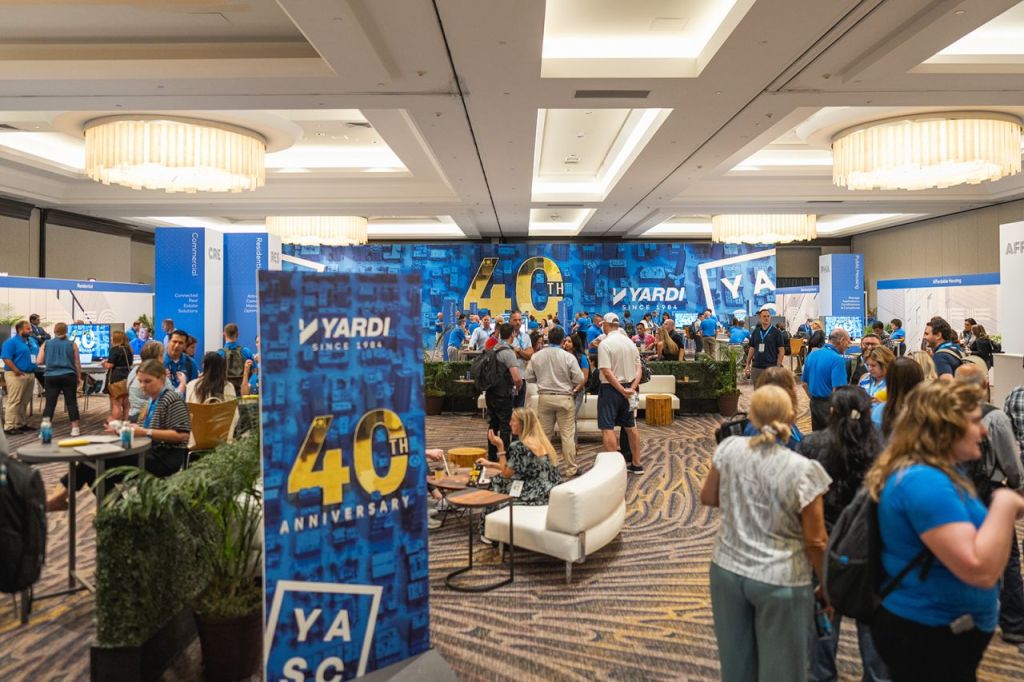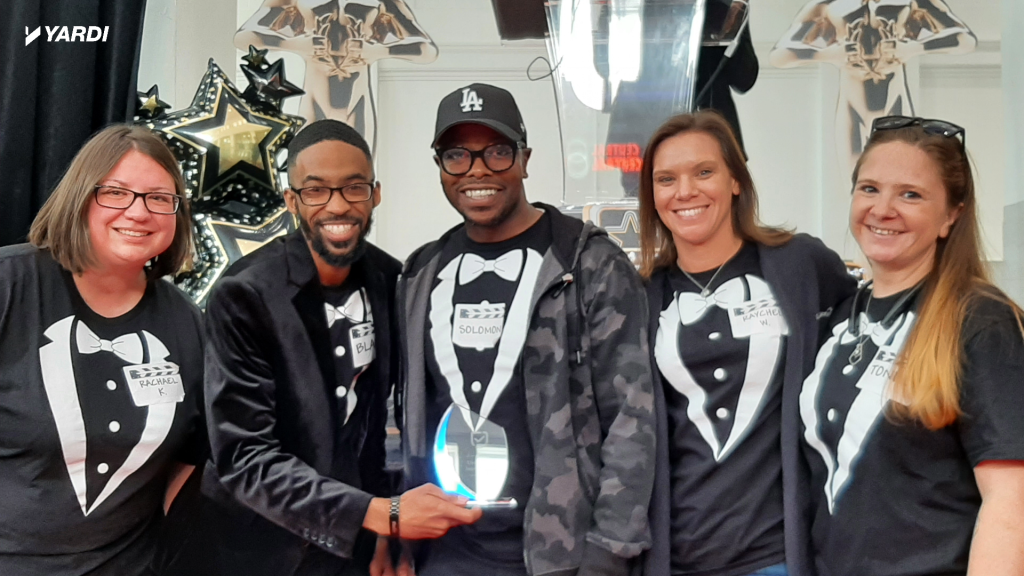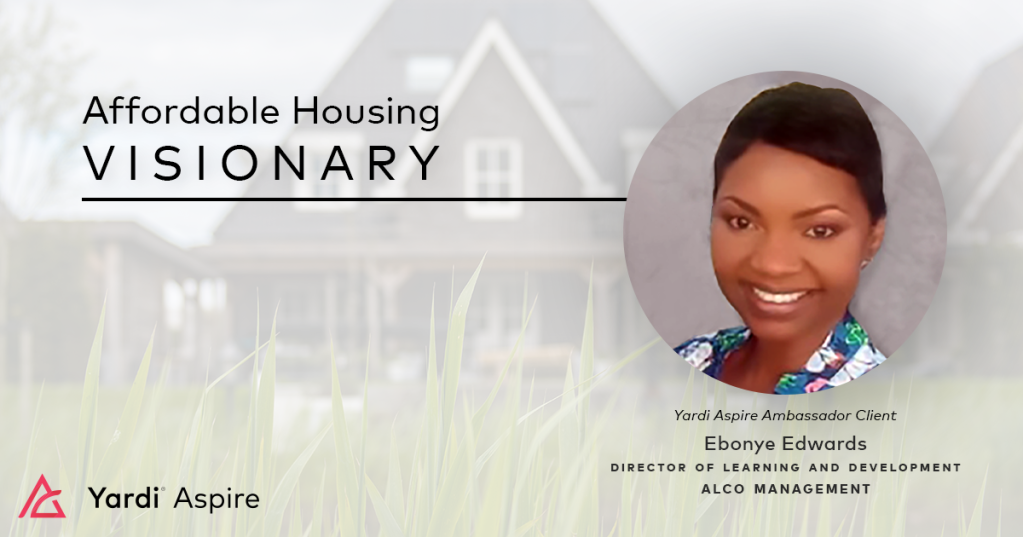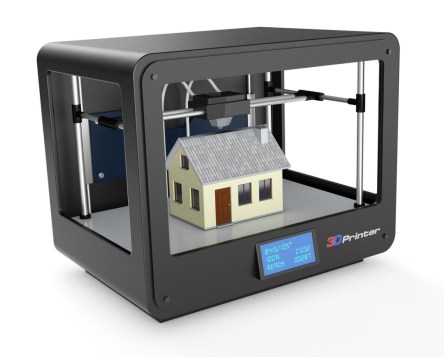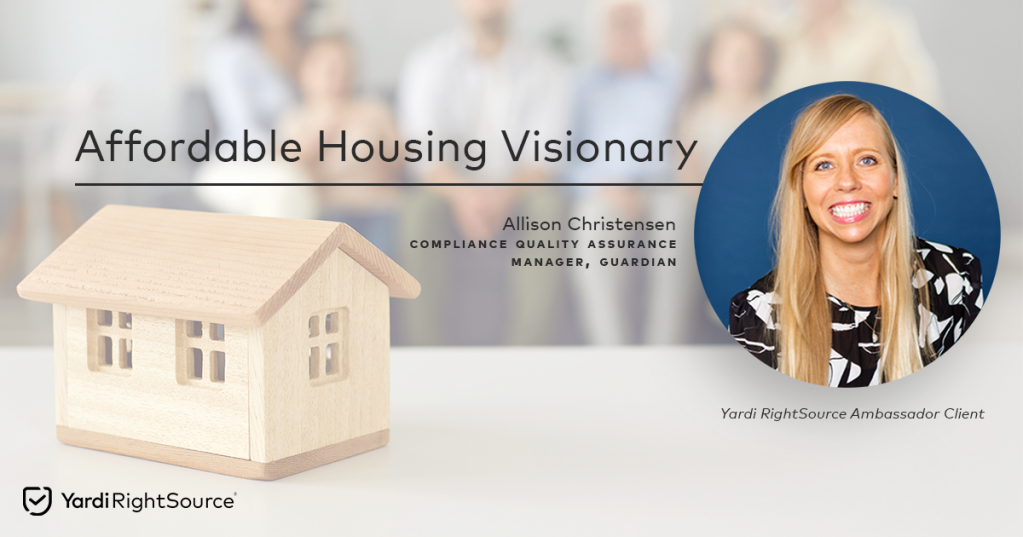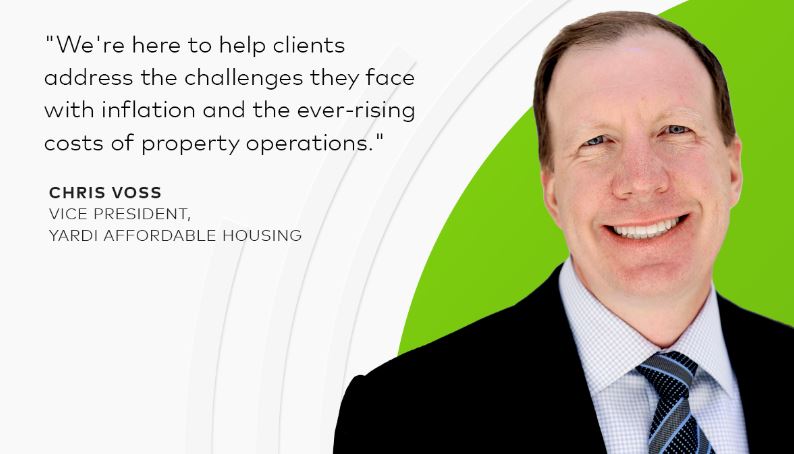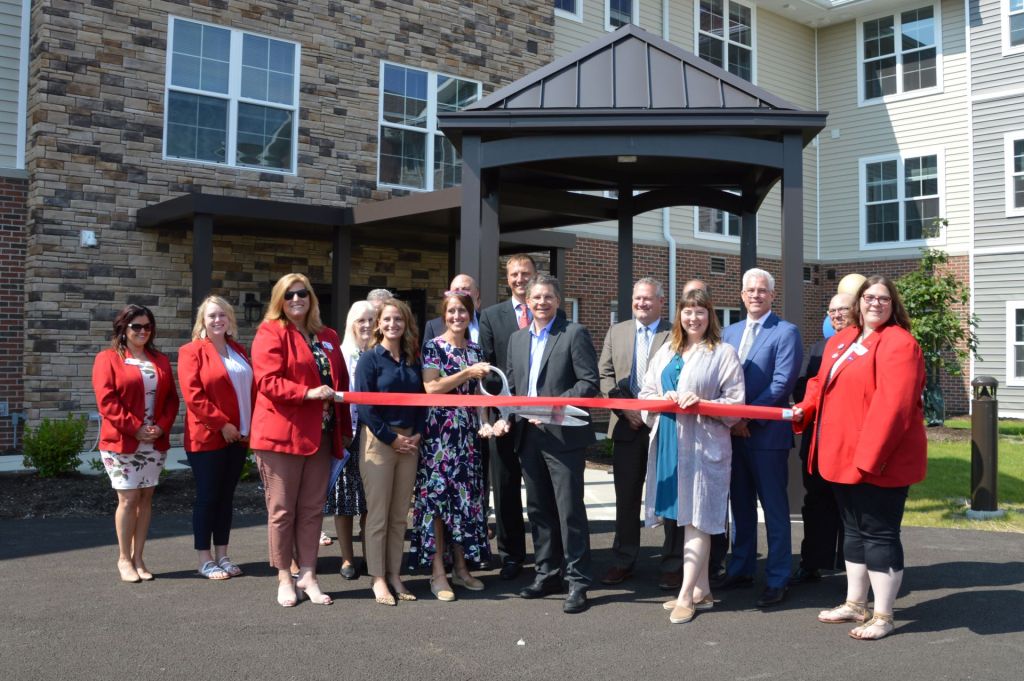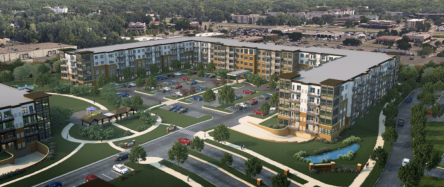There’s a lot to like about attending the Yardi Advanced Solutions Conference (YASC). It’s a treat for both Yardi team members and clients alike. The Yardi Party, for example, is always a lot of fun, especially this year as we celebrated 40 years. And there are hundreds of courses to choose from and new people to meet from every sector of the property and investment management industry. But, if you ask a Yardi team member the best thing about YASC, you’ll likely hear that seeing clients in person and speaking with them face-to-face is what they look forward to most. Late this summer in San Diego, Yardi representatives sat down for formal interviews with clients from the affordable housing industry. Interviewees included Christy Alvarado from MEB Affordable Management Services, Noel Gill from Northwest Real Estate Capital Group, and Priya Ramchandran from USA Properties Fund, among several others. Each of the interviewees expressed an admiration for the affordable housing industry and the positive impacts it has on the communities they work in. Christy Alvarado described how residents of MEB’s properties gain stability through an affordable housing unit. “The families we work with might be on the cusp of becoming homeless and unfortunately looking at temporary stays with different family members because of losing their own home. Affordable housing gives them personal space for cooking, sleeping and bathing. That sense of permanence that affordable housing provides is a big differentiator from staying with a friend or family member while trying to get back on their feet,” said Christy. MEB celebrates its families who move on to market rate housing not only because they’ve gained personal stability, but also because their departure opens affordable housing for another family in need. That cycle of housing stabilization is often supported by onsite services such as childcare, job training and personal counseling. Our conversation with Priya Ramchandran of USA Properties Fund, Inc., touched on the topic of accounts payable for affordable housing. Priya described how her accounting team benefits from the Yardi Procure to Pay solution set. “The sheer number of invoices our small AP team processes for our entire portfolio can become overwhelming, even resulting in some shut off notices and late fees. But we have eliminated those types of situations with AP workflows in Yardi Procure to Pay, which are easy to learn and use,” said Priya. Noel Gill covered many interesting topics during the interview, including how his organization uses the Yardi Aspire learning management solution. “We use Yardi Aspire to create unique learning opportunities for newly hired team members,” said Noel. He added that staff turnover at the property level is an ongoing challenge for many affordable housing providers, including his organization, the Northwest Real Estate Capital Group. Aspire, says Noel, makes it faster and easier to onboard new hires and to get them trained on workflows necessary to get up and running quickly. Noel also expressed appreciation for one of Yardi’s most core functionalities, accounting. “We started with Yardi on Enterprise, going back to around the year 2000. Over all those years, I’ve never found a better accounting system than Yardi,” said Noel. If you are a Yardi client and haven’t been to one of our conferences or live training events, visit Yardi.com/events to make plans to join us. Maybe you’ll be our next interview...
Spotlight on Affordable Housing
YASC session gives inside look
If you’ve attended a Yardi Advanced Solutions Conference (YASC), you know that Yardi addresses professionals from every property management industry segment, including affordable housing. The Affordable Housing Spotlight Session during YASC drew approximately 400 people representing providers from across the country. During the session, Yardi Director of Client Services Jackie Mills-Delling gave attendees a glimpse into Yardi’s vision for the future of affordable housing property management. Agenda items included a schedule of Yardi software releases, guidance on HOTMA implementation and solution overviews for different types of affordable housing organizations. What’s Happening with HOTMA? HOTMA stands for the Housing Opportunities Through Modernization Act of 2016. Through HOTMA, the U.S. Dept. of Housing and Urban Development is updating guidelines for several affordable housing programs that will streamline core administrative processes. Jackie provided HOTMA updates for HUD 50059, Rural Development, HOME and Low Income Tax Credit properties. The updates covered the changes that HOTMA will bring, including new forms, reports, financial calculations and more. “HOTMA has been an ongoing priority for Yardi as we work with affordable housing providers to get prepared for everything coming their way. YASC is a great opportunity to get a lot of people in the room to have a discussion of the current status of these important changes to the industry,” said Jackie. Voyager 8 Perhaps the most anticipated portion of the spotlight session was a look at Yardi’s newest version of its flagship affordable housing solution, Voyager 8. Voyager 8 includes a reimagined user interface for affordable housing professionals called Compliance Manager. YASC attendees saw a demo of Compliance Manager, many for the first time. Yardi expects to release Compliance Manager, powered by Voyager 8, in the coming months. Compliance Manager centralizes access to affordable housing data, compliance reviews, metrics, communication tools and automated income and asset verifications. With Compliance Manger, users can access each of these tools from a dashboard that does not require switching screens or logging into separate modules. “The new Compliance Manager interface will enable users to quickly see and access what they use as their daily routine. It truly is a reimagined user experience, and it’s coming soon for Yardi clients,” said Jackie. Current Yardi Voyager users will be able to access Compliance Manager at no cost and without extensive implementation efforts once they’ve migrated to Voyager 8. Solution Recommendations Another exciting portion of the spotlight session provided attendees with a look at Yardi affordable housing solutions that may be a great fit for their current and future needs. For example, the overview of Maintenance IQ showed how affordable housing providers can enhance their ability to comply with federal inspection standards “This tool has the potential to significantly enhance maintenance efficiency, reducing unit turnaround times and seamlessly integrating with procurement processes. It streamlines the integration of materials needed for tasks like changing a lock or faucet directly into the workflow,” said Jackie. Other products covered during the session included Yardi Aspire, which is a complete learning management solution, Yardi Verification Services which delivers income and asset verifications usually within a matter of minutes, Yardi Case Manager, a ticketing solution for tracking service delivery, and much more. “YASC offers a great time for our clients every year. But, beyond the fun and entertainment, there really is a focus on educating Yardi clients on our current and future solutions. There’s a lot to learn at YASC, and this affordable housing spotlight session was a great example,” said Jackie. Interested in attending a Yardi event? Check our events page for information about client events and industry tradeshows happening in the United States and Canada. If you’d like more information about Yardi affordable housing solutions, visit our website or call (800) 866-1144 to ask for an online...
Meet Yardi Case Manager
Q&A with Mark Livanec
Yardi Case Manager was introduced in 2023 and is one of the newest solutions integrated within the Yardi Affordable Housing Suite. Let’s learn more about it from Yardi Affordable Housing Industry Principal Mark Livanec. Mark, let’s start at the beginning. Tell us what a case is. Cases are any situation, ticket, or task that requires property managers or resident service staff to track and resolve. The flexibility of defining and managing case resolution workflows is one of the things I like most about Yardi Case Manager. Affordable housing providers have a lot of flexibility and powerful ticketing tools that will help them track the services they provide daily. There is also flexibility in how cases are created given Case Manager’s integration with the Yardi Affordable Housing Suite. A resident can create a case using their RentCafe Affordable Housing app on their mobile device, eliminating the need to make a phone call or visit the front office. There’s even automation built in that creates a set of tasks and team assignments necessary to resolve each case that come in from various sources. What’s the main reason Yardi clients should add Case Manager? Integration with Yardi Voyager, including our upcoming solution Compliance Manager powered by Voyager 8, make Case Manager a prime opportunity to strengthen affordable housing compliance without complicated workflows. Affordable housing programs are highly scrutinized by the federal, state and local funding programs. Yardi Case Manager can help keep providers in compliance by tracking service requests, reasonable accommodation requests, the work done to accommodate requests and how each case is resolved. How does tracking cases mitigate risk? One important example is fair housing, which includes laws that ensure affordable housing providers treat applicants and residents equally. Throughout the resident lifecycle, affordable housing providers need to document their interactions with every household they serve. When it comes to tacking and following through on requests, Yardi Case Manager is a great tool to keep everything consistent for everyone. Similarly, several laws require housing providers to accommodate reasonable requests for modifications to forms and living spaces. For example, applicants or residents may need special equipment installed in a unit because of a physical disability, others may need forms translated to a specific language. Not providing a reasonable request to make housing physically accessible can raise red flags with auditors and can lead to litigation. Yardi Case Manager is designed to make sure affordable housing site staff not only record the request for reasonable accommodation but serves as a tool to document follow-through efforts. Without proper documentation, your organization can be at risk of fair housing litigation. Domestic violence situations are another type of case that requires special attention and extreme confidentiality. Yardi Case Manager enables affordable housing providers to keep certain cases private and, on a need-to-know basis, to keep everyone safe and prevent unlawful disclosures. Why Yardi Case Manager when there are already prospect and resident records in Yardi Voyager? Yardi Case Manager has workflows that are specifically optimized for service delivery staff. That functionality can help keep things simple and effective since it’s easy to train, configure and use throughout the workday. There is, of course, integration with Yardi Voyager for access to cases through the upcoming Compliance Manager, powered by Voyager 8 dashboard. Cases can be tied to specific members of a household record, and notes from maintenance techs and inspectors can be copied to cases. But, if an affordable housing provider prefers to keep Yardi Case Manager as a tool primarily in use by their resident service coordinators and other front-line site staff, that works as well. How can Yardi Case Manager expand to help cover more types of requests? Case types can be configurable to unique request scenarios for applicants, residents, vendors/landlords, and even employees. Service coordinators can track case progress from start to finish via customizable tasks, team assignments and reports. The table below gives examples...
RightSource Metrics
An inside look at compliance numbers
Affordable housing may very well be the most complex component of the multifamily rental housing industry. Its regulations under federal, state and local programs are challenges that require expensive training and years of professional experience to master. Web developers using a computer together in a creative office. Two business people working on a new software developing project in an office. Given the complexity of doing business in affordable housing, it’s no wonder many organizations choose to contract with third-party compliance vendors such as Yardi RightSource. Chris Voss, Yardi vice president of affordable housing, founded RightSource in 2006. His company found its way to the Yardi family in 2020, creating a unique opportunity for Yardi clients to easily add compliance expertise to their team without having to recruit, hire or train new employees. “I’m proud of the team we’ve built and the services we provide. The numbers show RightSource is not only a successful product for Yardi, but is creating tremendous value for our clients. It’s truly a win-win as our client list grows and we deliver on our promise of reducing the cost and complexity of compliance for affordable housing providers,” says Voss. Let’s take a look at some key metrics to learn more about how RightSource creates value for its clients. Note: You’ll see the term “file” come up a lot in these stats. A file, in this case, means all of the documentation that a household must provide to an affordable housing provider to qualify for a unit. Files are the backbone of compliance as they are audited and reported on throughout the residential lifecycle in affordable housing. 24 hours In general, RightSource advises clients that a file submitted for review will be returned within 24 hours. That’s a stark difference from relying on in-office team members who may or may not be up to date with current regulations, or who may lack industry knowledge to make a truly informed decision of completeness within such a short period of time. AAMCI, a Yardi RightSource client since 2020, attests to the timeliness of file reviews. “RightSource delivers fast file reviews within 24-hours or less. That commitment and reliability helps us fill units faster with the confidence of knowing the data used to approve the file matches our records in Yardi Voyager,” said Deedra Burroughs, AAMCI chief financial officer. 220,000 files, annually Affordable housing providers submit approximately 220,000 files for review every year. That’s as of July 2024, and the number continues to grow. 10 minutes On average, RightSource auditors can actually complete a file review in just 10 minutes! Leveraging proprietary technology that sorts files, automates financial calculations and digitizes file data, the RightSource team and its decades of combined experience completes reviews with impressive speed. 1,900 files, monthly RightSource’s most active client submitted nearly 2,000 files in a single month last year. Imagine how many staff resources that would have required if completed by an in-house team of housing specialists instead of contracting with RightSource. Complete files in less than 1 week On average, it takes three RightSource reviews, each returned to the client usually within 24 hours, before an affordable housing file is determined to be complete and compliant with all applicable federal and state program mandates. If an applicant household can resolve file deficiencies quickly, they’re likely to be certified to live in a unit in less than a week. That’s a fraction of the time many affordable housing providers spend qualifying households without RightSource. Nearly 500,000 units RightSource clients own and operate nearly half a million affordable housing units. More than half of those fall under the Low Income Housing Tax Credit program which is overseen and run by housing finance agencies in all 50 states. RightSource keeps forms current for its clients for LIHTC programs and continuously updates them as each state makes programmatic changes. HUD 50059 units total more than 130,000, and...
Get On the HOTMA Express
Training is coming to a city near you
Changes to HOTMA guidelines are coming fast, particularly as implementation deadlines approach. If you don’t keep up with changing compliance rules, your team could be learning outdated information. HOTMA stands for the Housing Opportunity Through Modernization Act of 2016. Years in development, the Department of Housing and Urban Development (HUD) is now publishing final rules and developing technological standards for submitting compliance data. Don’t risk implementing HOTMA without knowing current standards. There’s a lot to learn and it all can become overwhelming without a well-informed training professional on your team or a contract with an outside affordable housing consultant. Plan Your HOTMA Training Just in time for 2024 implementation deadlines, affordable housing providers have a new opportunity to receive HOTMA training from the DeSilva Housing Group (DHG), a leading consultant serving the industry nationally. DHG calls this series the HOTMA Express. It’s an appropriate name because the trainings are fast and designed to catch up affordable housing providers with the latest changes to HOTMA implementation guidance. HOTMA Express sessions begin in March. The first in the series will happen in in Charlotte, NC and the next in Gatlinburg, TN. Registration fees for those two sessions are currently discounted by 50%. HOTMA Express trainings continue this summer and early fall in cities across the country. “We designed these courses with flexibility to adapt to HUD as they solidify HOTMA implementation guidelines. My team is diligently keeps up with notices in the Federal Register, and our learners can be assured that the content taught to be up to date with all current policies and procedures,” says Jenny DeSilva, DHG founder and president. DHG expects the training to be especially beneficial because they are live, in-person sessions. There will be ample opportunity for group discussion, questions and answers, and sharing successes and challenges. Attendees should feel comfortable to raise topics and respond to others as the live training environment will foster personal communication. How is Yardi Involved? Yardi® is the exclusive sponsor of DHG’s HOTMA Express trainings. Chris Voss, Yardi vice president of Affordable Housing, explains why. “Many of our clients have asked about the best ways to access HOTMA training. We do our best to make sure they know Yardi solutions will be ready once everything is set by HUD. But, training on best-practices for implementation new policies and procedures will often require a consultant with professional training experience. DHG is a perfect choice to serve in that role not only for our clients, but the industry as a whole,” says Voss. Get On Board While DHG’s HOTMA Express is sponsored by Yardi, it’s open to anyone who would like to register. You can find the training schedule and registration links on the DHG website. “This is a great opportunity for Yardi to help the affordable housing industry prepare for some of the most significant changes we’ve seen in years from HUD. Our team will be there during the live sessions to not only learn from DHG, but also to hear directly from affordable housing providers, clients and not, about their current challenges and effective strategies for HOTMA implementation,” says Voss. Yardi clients seeking even more affordable housing and PHA training, including HOTMA and dozens of other topics, can sign up for the Yardi Forum, coming to National Harbor, Maryland May 23 and...
Mastering Document Management
Affordable Housing and PHA Strategies
Affordable housing providers and public housing agencies face unique and significant challenges in managing documents across their organizations. These challenges are intrinsic to the industry given the number of files and documents required to remain in compliance with subsidy programs. But, with the right technology and document management strategies, these challenges can be overcome. For example, Microsoft SharePoint can make it easy to set up a system to store applicant and resident compliance files along with lease documents using date and naming conventions. It can simplify how users to manage and search for a move-in certification, a full resident recert file, or an individual verification document by property, resident name or date. And, as regulatory agencies, investors and auditors generally request more electronic file reviews than paper files, Yardi Document Management for SharePoint helps to deliver these documents efficiently. If your organization is lacking this type of document management oversight and is seeking technology to help, consider the following features. Five features to look for in affordable housing document management 1: Searchability Finding documents using native SharePoint functions is even more effective when coupled with AI meta data tagging. Adding OCR (Optical Character Recognition) capabilities that convert images of text into a machine-readable text format will make your search for elusive documents even more powerful, giving you the ability to look for keywords within a document. 2: Findability Organization for your documents is key. Implement a taxonomy with a uniform structure that makes it supremely easy to locate documents. Automation will ensure consistency and maintenance of your folder structures. Just as going to a big box store at any location in any state will give you the same layout and experience, a taxonomy that consistently organizes your documents to ensure a familiar experience makes information easy to find. 3: Scalability Without a document management system, managing information across an organization is a laborious undertaking. With an automated solution, it’s easy to maintain taxonomy and security for your documents on a large scale. Automation organizes your documents within hours, and when integrated with Yardi Voyager, you can access documents from a single source of truth. 4: Integration With seamless integration of your document management system with your Voyager property management system and other Yardi platforms (including RentCafe, Procure to Pay, Aspire) it’s easier for approved users inside and outside your organization to upload files. Security is managed in Voyager. Depending on the outside user, such as a vendor, when they upload documents they will not be aware that the files are stored in SharePoint behind the scenes. Inside your organization, users will be able to interact with the files in a SharePoint setting where they can leverage all of its features. 5: Compliance Laws and regulations are changing to require less paper and accept more digital documents. Maintaining compliance and security in this evolving digital environment is a necessity. Document management in SharePoint has many features for compliance including retention policies, workflows and the ability to integrate with third-party tools such as DocuSign to meet regulations. The Key to Streamlining Document Management The five features described above are all part of Yardi Document Management for SharePoint. Implementing this solution helps housing providers boost efficiency, increase data security and enables cloud-based access and sharing. It also helps organizations maintain consistent folder structures, manage security and permissions, integrate content and users, locate documents quickly and track multiple versions over time. Ready to achieve greater efficiency and functionality in content management across your organization? Yardi has a solution that enables you to take advantage of all the great features listed above. Join a Yardi Document Management for SharePoint...
Helping Clients Shine
Blake Cole Earns ALCO Award
Congratulations to Blake Cole, senior account manager for the RightSource client success team in Yardi’s Minneapolis office, who was recently named 2023 STAR performer by ALCO Management. Affordable housing client ALCO hosts an annual seminar for team members and vendors to celebrate success and train on industry-related topics such as Compliance, Fair Housing, and Physical Property Inspection. This is the second year ALCO has invited Yardi staff to participate, after onboarding with the RightSource software in the summer of 2021. Due to the RightSource integration, ALCO invites a member from each team to present information that is relevant to stakeholders. This year, they highlighted: Navigating the Top File Findings: A presentation where Cole identified the top five file findings found on ALCO’s uploaded certifications in RightSource over the last 12 months and detailed how to avoid these findings. Also highlighted was ALCO’s move-in certification performance. The quicker the certification can be approved, the faster ALCO can provide quality, affordable housing to those who need it. As of the date of this presentation, ALCO’s metrics exceeded the national average of all RightSource clients, coming in at four days and nine hours for approval (national average: five days, 16 hours). Stephen Kearns, senior team lead of client services for the Voyager/RCAH Team, presented upcoming changes to RCAH that will enhance the site staff’s software utilization. Lisa Furbush, manager of full compliance services for RightSource, presented the highly anticipated HOTMA changes that are forthcoming and how they may affect ALCO’s current processes. Joel Smith, team lead of the RightSource Client Success Team, presented awards to the site staff and properties who were high achievers according to RightSource metrics over the past 12 months (i.e., awards provided for properties who processed the most Special Claims, properties who most improved on completing their past due certifications, properties who had their MIs approved the fastest, etc.) The award Cole received was a surprise since ALCO typically honors their company site staff for outstanding achievement. “The next thing I see is this video playing that had me all in my feelings,” shared Cole. Cole’s history with ALCO dates back to their onboarding with RightSource, where he was the team lead for the Auditing Team. In May 2023, Cole was promoted to the RightSource Client Success Team as a senior account manager. Due to his great relationship and history with ALCO, he has been able to retain them as one of his clients. “This explains the purpose of the Captain America helmet I wore during the introduction of my presentation,” said Cole. (See photo at right.) “They are very familiar with this, but for those who were not, I reminded them that the “A” on the helmet stood for Captain...
Reimagining Affordable Housing Training
ALCO Talks Training
Our series highlighting affordable housing visionaries continues with a look at the work of Ebonye Edwards, director of learning and development for ALCO Management. ALCO is based in Memphis, Tenn. The company’s 200+ employees serve communities in eight states in the Southern United States. ALCO’s portfolio includes 59 properties with 5,497 units. How did Yardi choose Ebonye to feature in our Affordable Housing Visionary series? It’s her ability to recognize the usefulness of training and to implement technology that keeps ALCO in compliance with the ever changing standards of the affordable housing industry. She keeps ALCO’s in-office and remote workers trained using custom courses, curated learning plans, automated reminders and reporting tools. Q: Ebonye, tell us about your role at ALCO. EE: As Director of Learning and Development, my job is to make sure our team has the resources necessary to not only perform their job, but also to create career opportunities in the complex affordable housing industry. Q: What is your biggest accomplishment at ALCO to date? EE: When I was hired, our learning program used live instructional sessions held in virtual classrooms. I discovered that method to be a bit inefficient because classes would often be faced with unknown delays and absences that may have limited the potential benefits of training. Q: How did you mitigate those limitations? EE: At the time, ALCO was licensing Yardi Aspire, but with limited actual use. Our training courses at the time covered standard topics such as fair housing, sexual harassment and maintaining a drug-free workplace. All other topics, including affordable housing compliance subjects, were taught by our in-house instructors. They’d set a schedule with hopes of reaching everyone who needed training. Despite their best efforts, it was a challenge for everyone to attend. As I was considering the future of training at ALCO, I took a closer look at Aspire. I found that Aspire had affordable housing property management and compliance training content that could supplement, if not replace, much of the live training sessions we had difficulty coordinating across our regional work spaces. We considered the different roles at ALCO, such as property managers and maintenance teams and created learning plans based on those roles. Q: How does your team make sure your learning plans cover everything you need? A: Our Senior Instructional Designer is great at creating custom courses in Aspire. She uses the templates and design tools to roll out coursework to our team, and can normally complete a module in a matter of days. One of the biggest differentiators I have found with Aspire is that it’s not just a medium to get training content onto the screens of learners. Aspire is different because it also has built-in, proprietary content. That content often meets our needs, but when it doesn’t, our design team can easily tweak the classes or build new learning modules from scratch. Q: How does Aspire help ALCO with affordable housing compliance mandates? EE: Yardi helps us keep up with evolving affordable housing industry regulations. When HUD changes go into effect, Yardi Aspire immediately begins work to make sure our training content is compliant. I feel confident that our staff is learning up-to-date processes and procedures and not spending time on anything out of compliance. Q: How does automated content delivery make things easier for ALCO? EE: Centralizing training on a learning management solution, such as Aspire, replaces a lot of administrative work. Instead of keeping track of training schedules for each employee in a spreadsheet or database, we automate things on Aspire. It alerts our team members when they are required to recertify on fair housing, employment standards and on changing laws. Q: Was Aspire helpful for ALCO during the pandemic? EE: Yes. At the time, I felt like ALCO was ahead of the curve compared with what other affordable housing organizations may have been experiencing. For example, Aspire is great for...
New! Yardi Verification Services
Helping affordable housing providers
Reimagining core affordable housing processes is a high priority of Yardi’s development, support and services team. Our goal is to make compliance faster, easier, more cost-effective and sustainable. If we achieve that, then we’ll have made it easier for households to find, apply for, and move into affordable housing units. Faster verifications and move-ins mean fewer days vacant, more operating revenue and greater opportunity to serve more households in affordable housing communities. Yet, challenges exist that make it more difficult now for affordable housing providers to carry out their missions. Finding, training and retaining talent capable of navigating the complexities of compliance is a commonly cited barrier that affordable housing providers are trying to overcome. That’s where automated, professional services can help affordable housing providers make compliance faster, easier and more cost-effective. Reimagining Affordable Housing Verifications Qualifying for an affordable housing apartment is almost always based on the income and assets of an applicant household. The process is traditionally completed by housing specialists employed by affordable housing providers. They generate verification forms for employers and banks to complete, then work to ensure the information their applicants have shared about their household finances is verified and accurate. Studies show that process can take more than an hour of combined staff time, and up to a month or more to complete. It’s expensive, time-consuming, and relies on many steps to verify actual income. Now, there’s a new way. Yardi Verification Services is the latest innovative additions to the Yardi Affordable Housing and Yardi PHA suites. The automated solution makes verifying income and assets more affordable, more accurate and much less of a workload for on-site staff. Yardi’s strategic partnerships with several sources of financial data makes it possible for affordable housing operators to receive income and asset verifications much faster than doing the process manually. In most cases, verifications will arrive within minutes. Yardi Verification Services, only available to Yardi clients with a license for RentCafe Affordable Housing or RentCafe PHA, is a digital, paperless and hands-free process. There are no manual forms to fill out, and no waiting around for employers and financial services companies to complete and send back. Once a household begins a certification in RentCafe, they can consent via email or text message to having their income and assets verified by Yardi Verification Services. The housing provider’s on-site team receives the household’s verifications directly into RentCafe and records the verified totals to complete the certification. “I’ve worked for decades creating technology solutions with the ultimate goal of reducing the cost and complexity of affordable housing compliance. Yardi Verification Services is high on my list of products that accomplish that vision,” said Chris Voss, Yardi vice president of affordable housing sales. Affordable housing providers can learn more about Yardi Verification Services by joining an upcoming webinar. Yardi clients can also call (800) 866-1144 to reach their sales representative to schedule a free demonstration. Visit yardi.com for more information or download a...
Community Support
In Affordable Housing
In the face of inflation and rising costs of living, some affordable housing residents may struggling this year. Here are some creative ways to provide for families at your properties. Residents could be struggling with rising grocery prices. Local food banks and kitchens are the best options. Create easily available resources, such as a website page or flyer posted in community common areas, letting residents know where they can find assistance with groceries. Many food banks provide healthy foods as well. Find a guide to local food bank locations here. If your location allows, onsite community meals are another idea, which could be prepared with resident help or assistance from a non-profit willing to visit your location. For families with small children, childcare assistance is available in many regions. Become familiar with local resources and regulations in order to best assist residents. Consider a weekly or monthly activity for children living at the community so that parents can have a short break. Refreshments, games, or a movie afternoon are easy ideas for potential entertainment. Affordable healthcare is challenging to access for many, especially seniors who may have limited transportation options. Talk to local public health clinics and consider holding a quarterly mini-health assessment clinic. This can benefit all age groups. Many nonprofits help with health and wellness and are able to provide access assistance. If not onsite, a pickup/dropoff transportation service may be available, and you can share that information with residents. Car services like Uber and Lyft can get very expensive. For residents who do not have a personal car, consider having a “taxi” service available for them for a moderate fee. This can benefit many who need to pick up prescriptions or do quick errands. For residents who need access to technology,...
Benefits of e-Signatures...
Many of us have changed the way we go about our daily lives since social distancing efforts began in late 2019. Not only have we rolled with the changes, we’ve embraced them, morphed them into something better, and created new ways to work with each other. A major change affecting affordable housing providers and public housing agencies came in a notice from the United States Department of Housing and Urban Development (HUD) in 2020 by which HUD authorized use of electronic signatures in place of “wet” (i.e. ink) signatures to execute documents for many of its housing subsidy programs. Examples of affected programs include: Project-based Section 8 Rental Assistance Demonstration Project-based Rental Assistance (RAD/PBRA) Section 202 Senior Preservation Rental Assistance Contracts (SPRAC) Section 202/162 Project Assistance Contract (PAC) Section 202 Project Rental Assistance Contract (PRAC) Section 811 PRAC and Project Rental Assistance (PRA) Rent Supplement Section 236 (including RAP) Section 221(d)(3)/(d)(5) Below-Market Interest Rate (BMIR). Why are e-signatures a game changer for subsidized housing? Eliminating ink signature requirements save time and money for affordable housing providers and public housing agencies. Rather that dealing with paperwork, these organizations can now set up digital workflows that reduce paper usage and storage costs. Those online workflows can save significant staff hours and create more time to serve residents. E-signatures are more convenient for affordable housing and PHA applicants and residents. They can execute documents when they have a free moment, instead of taking time off work or from childcare to visit an office to sign forms. Audits are also faster, easier and safer with the use of e-signatures. Because workflows are paperless, auditors can monitor files without having to come into an office. Instead, they can access affordable housing and PHA files from a remote workstation to...
3D Home Update
Aiding Affordable Housing
3D printing has picked up the pace in the housing market, especially with inflation rising. Builders can print houses faster building with more earth friendly resources and fewer staff. Let’s explore the latest updates with 3D homes in the affordable and single-family housing markets. The University of Maine unveiled the first 100% bio-based 3D printed home made entirely with bio-based materials. It features 3D-printed floors, walls, and roofs of wood fibers and bio-resins. The house is fully recyclable and highly insulated with 100% wood insulation and customizable R-values. “Our state is facing the perfect storm of a housing crisis and labor shortage, but the University of Maine is stepping up once again to show that we can address these serious challenges with trademark Maine ingenuity,” said Gov. Janet Mills. “With its innovative BioHome3D, UMaine’s Advanced Structures and Composites Center is thinking creatively about how we can tackle our housing shortage, strengthen our forest products industry, and deliver people a safe place to live so they can contribute to our economy. While there is still more to be done, today’s development is a positive step forward — one that I was proud to support through my Maine Jobs & Recovery Plan and my budget.” The technology is designed to address labor shortages and supply chain issues that are driving high costs and constricting the supply of affordable housing. Due to automated manufacturing and off-site production, less time is required for on-site building and fitting up the home. Printing using abundant, renewable, locally sourced wood fiber feedstock reduces dependence on a constrained supply chain. These materials support the revitalization of local forest product industries and are more resilient to global supply chain disruptions and labor shortages. Using advanced manufacturing processes and materials, future low-income homes can be...
Reimagining Affordable
Guardian Discusses Compliance
What does it mean to reimagine affordable housing? Who are the affordable housing property managers and compliance professionals leading the way? How do Yardi solutions fit in? Stay tuned to The Balance Sheet over the coming months to read our new series highlighting the work and successes of who we are calling Affordable Housing Visionaries. Throughout the series, we’ll speak with affordable housing providers and learn how their use of evolving technology has helped them reimagine the future of affordable housing compliance. Guardian achieves measurable outcomes with outsourced compliance First in the series is Guardian, based in Portland, Oregon. Read on to learn how Guardian’s Compliance Quality Assurance Manager, Allison Christensen, is leading the organization’s embrace of outsourced affordable housing compliance expertise to build a stronger team and achieve measurable benefits. Q: Hi Allison! Please introduce us to Guardian. AC: Guardian is a developer, owner and operator of multifamily properties. We provide innovative real estate solutions dedicated to community and housing for all. We are based in the Pacific Northwest, and our customer-focused team is committed to supporting and lifting the communities we serve. Q: Describe an example of compliance technology that Guardian has implemented? AC: In July 2020, we began contracting with Yardi RightSource to review affordable housing applicant and recertification files for completeness and compliance with our funding sources. We’ve found that RightSource has helped Guardian expedite our file processing times, improved our data accuracy and leveraged data integrations for greater efficiency. Q: Tell us more about how data integration is valuable? AC: Yardi Voyager is our core operating platform for managing properties, finance and affordable housing compliance data. And, because RightSource auditors have seamless integration with Voyager, we are assured that our compliance data is always accurate and up to date. Q: How did Guardian adjust its team structure after adding RightSource compliance services? AC: It’s true that our staff assignments changed once we outsourced a portion of our compliance services. However, the process was done with care and consideration of all affected team members. Some of Guardian’s former compliance team members were reassigned within the company, and others even began working at RightSource. Everyone landed in a great space. RightSource was very helpful in ensuring staff assignment changes were handled with care. Q: Please describe Guardian’s compliance reporting processes? AC: One of the benefits of adopting new solutions is the ability to simplify processes which, in the past, may have been particularly stressful on staff resources. We’ve found that adding RightSource simplifies reporting because of how data is shared between auditors and Yardi Voyager. As part of the audit process, RightSource team members ensure compliance data is accurate while connected to the core Voyager database. That reduced chances for errors or misplaced data due to extraneous data transfers. So, when it’s time for Guardian to compile data for compliance reporting, we feel assured our reports are accurate and reflective of everything our properties have achieved. Q: How does training fit in with reimagining affordable housing? AC: The complexities of affordable housing are real, and training has always been a core component of successful strategies. We provide our employees with self-paced instructional content that’s available online. We’ve found this type of training resource is more effective than what the industry had traditionally relied on. RightSource makes the content available and updates it as compliance regulations evolve. It’s a great resource for new and current staff. Q: What is the central benefit Guardian has achieved by adopting new compliance technology? AC: Communication. Embracing outsourced compliance services keeps us well informed with everything happening with our new resident applications and current resident recertifications. We can log in any time to see exactly where all files are in the queue. For example, which applicant files are incomplete, which are pending review, which are coming up for recertification, and on and on. RightSource promises a 24-hour turnaround for file review, and...
Affordable Housing Tech
Insight from Chris Voss
Editor’s note: The following interview was originally published on The Breezeway, the official blog of Yardi Breeze. Chris Voss is currently a vice president at Yardi, but he’s been working in affordable housing for over 20 years. In that time, he’s worked on the investor side of the business, putting together tax credit deals to help developers get their properties built. He later shifted gears and spent a number of years working directly with operators. He’s experienced in helping property management companies optimize and modernize with the help of affordable housing and compliance software. Chris is the perfect person to discuss the future of affordable housing. Keep reading to see how he’s helping Yardi revolutionize affordable housing and simplify compliance. What’s the goal of Breeze Premier?We’re looking to bring everyone on our legacy systems over to Yardi Breeze Premier. This will help us better support our clients with newer software and get upgrades out faster. It also provides a portal for applicants and residents to apply online, make payments and enter work orders. Are there any features that tend to convince people to switch or migrate?One of the bigger points of interest for our residential clients is the ability to launch branded corporate and property websites with RentCafe. This is our marketing and leasing solution built into Breeze and Breeze Premier to support online leasing. It also includes options for integrated screening and renters insurance. Historically, rent collection and work order management have been done manually, so to have an integrated system is really compelling. The most-used feature of RentCafe is probably the resident portal, which automates rent collection and centralizes online maintenance requests. And residents love the RentCafe Resident app. Looking back, what made the previous generations of Yardi software relevant in their time?Years ago, Yardi Genesis and Yardi Genesis2 were some of the most powerful property management systems around. This was especially true for small to mid-sized companies. They didn’t need everything a system like Yardi Voyager had to offer. However, a lot of that functionality was built in to help clients with activities in the back office such as bookkeeping, financial reporting and resident tracking. The reality is that a lot of employees at smaller affordable companies wear multiple hats. They do more than back-office activities. That’s where Breeze Premier come in. What’s making Breeze Premier relevant in our time?In addition to accounting, operations and reporting, our latest property management software includes built-in marketing and leasing tools plus a host of optional add-on solutions to do even more. We’ve implemented text messaging to better communicate with residents and introduced a CRM queue to track customer communications and initiate follow-ups. We leverage artificial intelligence to communicate with potential residents using our RentCafe Chat IQ chatbot. We provide the option for clients to outsource their utility billing and utility invoice processing, among other features. Not to mention, we just rolled out maintenance call center services to Breeze Premier clients with RentCafe Connect. If you were to reimagine affordable housing, what might it look like?Reimagining the future of affordable housing is really about finding ways to reduce the costs and complexities of operations. It starts by reducing the friction that is involved with finding and applying for an affordable home today. RentCafe.com is an internet listing service available for our residential clients. Even a person who wants to move to a different state can now easily apply online. They can also complete the entire certification process without ever having to walk into that out-of-state property. We’re also trying to eliminate fair housing complaints from even arising. With RentCafe Affordable Housing, the certification and application process are done online, so the manager never has influence over the application process. So even if that household ends up being denied, they can’t point back and say the property manager was discriminating against them. Put it this way: In every respect, the future...
Reimagine Staff Resources
5 Affordable Housing Trends
Attracting top talent and retaining valuable employees is a top priority for many organizations, including those in the affordable housing industry. As economic systems evolve during the recovery from the COVID-19 pandemic, affordable housing providers have an opportunity to rethink what to expect from their onsite workers. Many are finding that this is a great time to change their strategy and improve the services they offer to prospects and residents. Ready for a look at what the makeup of your onsite staff and compliance team could be? Here are 5 ideas to consider: 1. Prioritize Customer Service Safe and healthy communities start with your onsite team placing the highest priority on resident services. Hire onsite workers for their property management skills and leave the complexity of compliance to a dedicated team of experts. And don’t neglect your investment in technology, today’s workforce expects the right set of tools to do the job. “Property management is a hard job, and affordable housing compliance makes things even more complicated. The next generation of property managers can only be comfortable with a certain level of technology in place to help them be successful. The old ways of paperwork, phone calls and in-person meetings just aren’t an option moving forward,” says Anna DiSabato, vice president of Dunlap and Magee in Phoenix, Arizona. 2. Outsource Compliance Work Speaking of compliance experts, Yardi RightSource offers scalable services that fit your specific needs. Affordable housing providers that use Yardi Voyager can securely send data to RightSource and get: Fast file reviews and audits with guaranteed response timesFull-service certifications and recertificationsAutomated forms management for programs across the country Dunlap and Magee is in its final stages of implementing Yardi RightSource and is already seeing measurable results. With RightSource, they see file audits complete within 24 hours and can have fully approved, move-in ready tenants usually within five days of initial contact. 3. Solve Compliance Challenges Is there a particular affordable housing compliance challenge that your organization can’t seem to fully resolve? Or, is there a new initiative or affordable housing program your team is taking on? Yardi RightSource can help with consulting and training services built on decades of combined affordable housing experience. 4. Boost Institutional Knowledge People want to work for an employer that can make them more valuable, and offering top-notch training is a great way to make it happen. By elevating employee knowledge, affordable housing professionals not only become more knowledgeable, and promotable but also are able to demand higher wages. While that may sound like a cost to employers, you can also look at it as a great way to attract top talent and inspire less experienced team members to grow. Create an employee university with Yardi Aspire, Yardi’s comprehensive learning management platform. Aspire includes customizable online coursework that covers every major real estate management industry, including affordable housing. With Aspire you can assign tracks of courses, view learning metrics, make company announcements and more. 5. Get More from Remote Workers Enduring the challenges of COVID-19 taught us that it’s possible, and not too much of a challenge, to keep business processes moving even as workers transitioned to remote workspaces. Developing technologies for affordable housing are helping to make remote workers and contactless service delivery more effective. Yardi mobile solutions streamline payment processing, procurement, compliance workflows, resident communication and more. RentCafe Affordable Housing has changed traditionally paper-based affordable housing applications into online forms that can be completed and worked on 24/7 from most handheld devices and personal computers. Affordable housing applicants use RentCafe to search for a unit, submit documentation of eligibility, work with case workers to qualify and complete the leasing process without coming in for multiple in-person meetings in an office space. Yardi Procure to Pay and Payment Processing are perfect solutions for accounting departments that need remote access. Procure to Pay enables online shopping for property supplies with fast and...
Affordable Housing
For female veterans
Did you know that one of ten homeless Americans is a veteran? That’s more than 40,000 veterans without secure housing. The number of women among them is rising, per the United States Interagency Council on Homelessness (USICH). Volunteers of America is stepping up to help vulnerable female veterans get back on their feet. Actively supporting an overlooked population Veterans make up more than a tenth of people facing housing insecurity. Among them, about 20,690 veterans rely on shelters or transitional housing. The remaining 15,366 are unsheltered, living in cars or on the streets. Per USICH, women compose about 9% of veterans who are experiencing homelessness, and women are also about 9% of the overall veteran population in the U.S. Veteran women are more than twice as likely as non-veteran women to experience homelessness. Unlike their male counterparts, more than one third of veteran women who experience homelessness were subjected to military sexual trauma. They also have lower rates of substance abuse and mental health concerns than their male peers, the USICH report states. Family activity is also a differentiator. Veteran women experiencing homelessness are likely to be an active part of a family unit. The average family size is 3.6 members. Women are expected to become 12% of all active-duty members of the armed forces by 2025. The rise in participation foreshadows an increased necessity to address the unique needs female veterans. Judge Sarah J. Harper Village, serving women who have served America Volunteers of America (VOA) Ohio and Indiana have teamed up to support female veterans in the region. The organizations broke ground on Judge Sarah J. Harper Village, a long-term affordable housing community. The 12-unit project will have two buildings, each 3,000 square feet. Both have six fully furnished units. There are...
What Home Means to Me
Affordable Housing Calendar Contest
What does home mean to you? For many of us in the housing industry, we are consumed with the details of the structure and its operations. We perfect safety codes, smooth workflows, and stellar marketing. But at the end of the day, we specialize in homes, the very backbone of America. The National Association of Housing and Redevelopment Officials (NAHRO) recently announced the winner of the What Home Means to Me poster contest. The contest is a brilliant reminder of the necessity of affordable housing and the role it plays in wellbeing of the nation’s youth. Sharing stories for nearly 20 years Founded in 2008, the What Home Means to Mecontest celebrates children’s stories and creativity. The contest is open to children ages 5-18 who are living in affordable housing developments. Participants submit artwork accompanied by messages about their homes and the impact of housing professionals and community development officials. Each housing authority holds the initial round of evaluations, followed by eliminations at the state and regional levels. The winning submissions are then evaluated in Washington, D.C. before a panel of three judges. The judges choose 13 winners to receive a $100 Visa gift card and features in the 2022 What Home Means to Me Calendar. Calendar sales contribute to the jackpot for the next years’ contest winners. The grand prize winner also receives a framed copy of their artwork, an iPad and a trip to the NAHRO Washington Conference where they are publicly recognized. When feasible, they are also able to meet their Congressional representatives. Congrats, Hector! This year’s winner is Hector from Puerto Rico. He writes: “My home means…more than a building. It means everything I do, I feel, I learn and my hobbies.” He continues, “My family is my home. They’re who taught me since I was a baby how to speak, eat, walk, study and my daily routine. They give me support, care and security everyday. They taught me to love and to have other feelings.” Click here to view a record of winning artwork. Creating home with NAHRO Yardi is a proud sponsor of NAHRO. Since 1933, the organization has supported affordable housing, its infrastructure and legislation. The organization is currently composed of 19,500 members that serve more than 3 million homes and 8 million residents. Yardi is Energized for Good! Click here to read more of our heartwarming stories of community involvement....
Committed to Housing Preservation
Hudson Valley + Lincoln Park Towers
Yardi client Hudson Valley Property Group (HVPG) has acquired Lincoln Park Towers in Newark, NJ. The New York-based firm recently began a major revitalization effort at the site. The project is a step forward for The City of Newark in addressing a growing call for affordable housing in the area. Lincoln Park Towers revitalization Lincoln Park Towers contains 80 units spread across 17 stories. The senior affordable property was originally constructed in 1927 and is honored as a part of the Lincoln Park Historic District. Image Courtesy of HudsonValleyPropertyGroup.com HVPG is beginning unit-level renovations as well as overall sustainability and safety upgrades: the firm will add new cabinets and countertops, eco-friendly fixtures, update smoke detectors and install emergency pull cords in all units. New amenities such as entertainment and fitness spaces, a community room with a kitchen, designated on-site parking, and laundry facilities are on the docket. The structure will also receive a makeover from top to bottom including a new roof, façade facelift and repairs to the windows and elevators. In a nod to the modern age of senior housing, HVPG is including building-wide Wi-Fi au gratis for residents. It is estimated to save residents between $40-$70 per month. The site will be updated to facilitate high speed internet for those that purchase it. The firm will complete the project without displacing residents. The undertaking has a projected cost of $15.2 million. Once complete, the housing will remain affordable thanks to a 20-year Housing Assistance Payment contract issued by the Department of Housing and Urban Development. Terms include a Section 8 agreement with units leased to residents earning no greater than 30% – 50% of the area median income. Fulfilling the mission to preserve and revitalize Lincoln Park Towers marks the final investment for HVPG’s first private equity real estate fund. The endeavor included $60 million of capital commitments and $120 million of co-investment equity. As a result, HVPG has been able to invest more than $1 billion in projects, honoring its mission to preserve the financial and physical stability of affordable housing. In total, 25 properties including more than 4,000 units will receive the updates needed to be viable housing. “HVPG has developed a consistent process for revitalizing existing housing to preserve affordability, improve quality, and increase efficiencies,” said Jason Bordainick, CEO and co-founder of HVPG during an interview with Affordable Housing Finance. “Leveraging private equity allows us to significantly expand our reach, earning a reliable return for investors while serving more residents and communities.” Fulfilling the call for affordable housing in Newark, NJ The revitalization of Lincoln Park Towers is representative of an approximately $14.7M investment into the City of Newark’s affordable housing supply. Newark Mayor Ras Baraka on recently promised to create or preserve 6,600 affordable units in Newark by 2026. Though the quantity falls short of the 16,000-unit shortage cited by researchers at Rutgers University, Baraka and his team are celebrating the step forward in the right direction. Baraka explains, “We have to keep building and doing what we can with the resources that we have and prayerfully we get some support from state resources and federal resources to continue to do this.” Read the latest updates in affordable housing on our News...
3D-Printed Housing
Habitat for Humanity, Tempe
Habitat for Humanity is leading the way on innovative housing solutions. The Tempe branch is exploring 3D-printed ranch-style homes to address a growing need for housing. The flagship structure demonstrates the efficiency and beauty of combining conventional and 3D printer construction. It takes a village to print a 3D house The three-bedroom, two-bathroom house was designed by Scottsdale-based Candelaria Designs and printed by PERI group of Germany using a Build On Demand (BOD2) printer. More than 20 sponsors provided funding. The house contains 1,738 square feet of living space and a total of 2,433 square feet for the project, reports the nonprofit. Of the total square footage, 70-80% of the house will be 3D printed. The BOD2 works alongside construction crews and volunteers. It uses the gantry principle, which allows it to move in any position within the structure, printing inner and outer walls in thin layers. As it prints, human workers can continue their electrical, plumbing and other tasks. Humans will also install the ceilings. Construction is scheduled for completion in October 2021. Explore Habitat for Humanity’s earth-friendly passivehaus design. For now, the BOD2 house at 677 W. 19th St. will be one-of-a-kind. The 15 adjacent homes will be traditional builds on four city lots. Habitat for Humanity has made it clear that more 3D-printed homes are of interest. The project is a direct response to an acute affordable housing crisis in the area, reports the nonprofit. About 20% of renters are considered extremely low income. Of them, 75% of households are severely cost burdened. The phrase is used by the National Low Income Housing Coalition to describe renters spending more than 30% of their income on housing. The state would need more than 136,000 affordable units to safely house extremely low-income renters. Scalable, affordable...
Livable Communities Act...
Affordable Housing + Transit
The Livable Communities Act of 2021 aims to develop transit alongside affordable housing, creating more efficient and equitable access to major job hubs and neighborhoods. The act attempts to tackle two contentious issued for Americans. The Livable Communities Act of 2021 The first step is to create an Office of Sustainable Communities within the Department of Housing and Urban Development (HUD). The division would “promote interagency coordination on the development of affordable housing, transit systems, and other community needs.” The Office of Sustainable Communities would have its own credit facility. From there, regional development grants would be available through the Comprehensive Planning Grant Program. Eligible recipients would demonstrate partnerships between local governments, city planning, and Indian Tribes (where applicable) and other community members to create “sustainable, affordable housing with access to transit.” In addition to sustainability, the Act includes a clause to prioritize health-conscious housing and reduce housing-related health hazards. The Act reserves 25% of funding for high-poverty communities. Such areas are greatly affected by long waitlists for affordable housing as well as a lower quality of living and a high concentration of health concerns. Sen. Bob Menendez (D-N.J.) introduced the legislation supported by Sens. Catherine Cortez Masto (D-Nev.), Chris Van Hollen (D-Md.), Ron Wyden (D-Ore.), Jack Reed (D-R.I.), Kirsten Gillibrand (D-N.Y.), Alex Padilla (D-Calif.), and Richard Blumenthal (D-Conn.). Menendez says, “Our communities are stronger when hardworking families can afford to live close to where they work. As the nation faces an affordable housing crisis, we don’t want to see teachers, first responders, grocery store clerks, restaurant staff, and other essential workers be priced out of the neighborhood.” He continues, “Creating ‘livable communities’ is all about connecting workers to good-paying jobs through expanded affordable housing options and access to good public transportation by inextricably and...
Creative Affordable Housing
Pennrose Expands Options
Pennrose expands with the opening of three affordable housing developments including an innovative LGTBQ senior housing project. LGBTQ senior housing Yardi client Pennrose partnered with Cincinnati-based Northsiders Engaged in Sustainable Transformation to create John Arthur Flats. This community will be the city’s first LGBTQ-friendly affordable senior housing community. John Arthur Flats groundbreaking ceremony. Image courtesy Pennrose. John Arthur Flats is comprised of 57 affordable units across a single three-story building. Floorplan options include studio, one- and two-bedroom options. The site is opening for seniors earning between 30% and 60% of the average median income (AMI). Community amenities include laundry facilities, a fitness center, outdoor communal space as well as the indoor Maureen Wood Community Room. Additional features include walkable access to the Northside business district, shops, restaurants and the McKie Recreations Center. Pennrose Management Co. has also teamed up with the Council on Aging of Southwestern Ohio, Churches Active in Northside and the health-centered nonprofit Caracole to offer supportive services for residents. Both names emblazoned through the community uplift LGTBQ contributions to society. John Arthur, the namesake of the community, was a Cincinnati native and co-plaintiff in the landmark court case that legalized same-sex marriages in the United States. The Maureen Wood building is named in honor of a local shop owner who also worked to empower single women and mothers through home improvement classes. “Today marks the first step in transforming a formerly vacant, underutilized site into a vibrant community asset,” said Timothy I. Henkel, principal and senior vice president at Pennrose in a press release. “LGBTQ older adults experience higher rates of poverty and housing discrimination, and innovative housing solutions like John Arthur Flats create an inclusive, safe and welcoming environment for seniors to age in place comfortably. We hope this development serves as an example in neighborhoods throughout Ohio and the country.” The community broke ground in August 2021 is scheduled for completion in summer 2022. Eastern Woods village offers housing for every generation John Arthur Flats comes on the heels of the grand opening of two other projects. Eastern Woods Senior in Findlay, Ohio and Northside Village in Schenectady, N.Y. Eastern Woods Senior is a LEED Silver-standard building that honors universal design principals for people of all ability levels. The community offers 44 apartments ranging from one- to six-bedroom floorplans. The units are spread through a single three-story building that includes conveniences such as laundry facilities, communal space, storage facilities and a fitness center. Eastern Woods grand opening. Image courtesy Pennrose. Eligible residents earn less than 60% of the area median income. Additionally, five units are designated for Section 811 participants, residents with disabilities who also meet the income standards. Eastern Woods Senior is part of the larger 120-acre mixed-use Eastern Woods campus. Senior special-use buildings include the Eastern Woods Senior as well as the nearby Birchaven Village. The latter is a continuum of care retirement community. Residents of Eastern Woods will have access to Birchaven Village services including heath services and on-site programs. The Eastern Woods campus is truly housing for all generations. It includes the market-rate Apartments at Eastern Woods and Birchaven Estates at Eastern Woods, a neighborhood of single-family homes. “We’re proud to partner with Blanchard Valley Health System to execute their strategic vision of creating high-quality, affordable housing for seniors in an amenity-rich environment,” said Henkel. “The integration of healthcare and housing has proven to be impactful for overall health and wellbeing, and we are excited to welcome residents into their brand-new homes in a walkable, mixed-use environment.” Northside Village presents two phases of quality affordable housing On the east coast, the Northside Village community brings more affordable housing to Schenectady. During phase one, Pennrose rehabilitates 25 apartments on Van Vranken Avenue. (Residents of the current community will have first selection when the renovated units are complete.) In phase two, the organization expands to include 64 new construction units. Prospects...
Dominium Expansion
Minnesota Affordable Housing
Minnesota will soon have more affordable housing options. Plymouth-based developer an Yardi client Dominium selected a 5.2-acre parcel in Roseville for its newest affordable project. The market is ripe for new development, with recent average vacancy rates hovering around 2.2%. A local average rate of 5% is typical in a balanced market. The Harbor at Twin Lakes will be a senior affordable housing community. It will offer 277 units including 131 one-bedroom units, 116 two-bedroom and 30 three-bedroom units. The units are divided between five floors within a single building. Photo courtesy Dominium The rent-restricted neighborhood will accommodate residents aged 55 and over who earn 50% of the area median income or below. Exploring the neighborhood near The Harbor at Twin Lakes The Harbor at Twin Lakes will be a walkable community with access to shopping and dining. The community includes seven commercial properties, surface and underground parking. Just eight miles from Minneapolis and 10 miles from downtown Saint Paul, the community is conveniently located near several local attractions. The Harbor parcel, located at 2730 Herschel St., is part of the larger Twin Lakes Station redevelopment. It rests adjacent to Oasis at Twin Lakes, an affordable housing community with 228 units. The units are divided between two low-rise buildings. Construction on the $74 million Oasis project began in July 2020. It is scheduled for completion in 2022. “Dominium is very excited to announce this new development as it will provide much-needed high-quality affordable housing in the Twin Cities metro,” said Dominium Vice President and Project Partner Ryan Lunderby. Financing The City of Roseville has provided a $35 million bond for the development of The Harbor. Tax-exempt financing, once offered by Greystone, is now managed by Freddie Mac. The property is also funded in part...
Arizona Affordable Housing...
New LIHTC Supplement
In Arizona, there are only 26 affordable and available rentals for every 100 extremely low-income renter households, reports the National Low Income Housing Coalition (NLIHC). State leaders have approved a state housing tax credit to offset the affordable housing shortage. New and expanded programs for affordable housing in Arizona The program provides $4 million per year in state credits until 2025. It is supported by the 4% federal low-income housing tax credit (LIHTC) program. Combined, builders can seek relief up to 50% of the project cost. Analysts suggest the credits will prompt about $160 million in investments during that period. “That will make a significant dent in our housing shortage in Arizona,” says Tom Simplot, director of the Arizona Department of Housing (ADOH) in an interview with Affordable Housing Finance. Additionally, the ADOH will offer more programs that work in tandem with the 4% LIHTC. These programs result in $21 million in state and national housing trust funds. “What we learned from our research of other state programs is that it’s very impactful and powerful to couple the state credit with the 4% credit,” says Ruby Dhillon-Williams, assistant deputy director of housing and community development. To further stimulate growth, ADOH is revamping its qualified allocation plan (QAP). The current plan includes one cycle of 9% credits and 4% credits less consistently. The new programs are slated for release in QAP 2022. The national affordable housing crisis Per the NLIHC, there are fewer than four affordable rental homes for every 10 extremely low-income renter households nationwide. Not a single state has an adequate supply of rental housing to meet the needs of the poorest renters. As a result, “70% of extremely low-income renter households are severely housing cost-burdened, spending more than half of their limited...
Housing + Self-Sufficiency...
I Rise, from New Directions
Access to affordable housing can be a life-changing experience for residents, especially when residential units are paired with social services. HUD’s Family Self-Sufficiency (FSS) program is a perfect example. The goal of FSS is to transform individuals and families by stabilizing housing and providing services like childcare, education, physical and mental health, food and other tools to overcome barriers to increasing income. New Directions is a mission-based affordable housing provider based in Louisville, Kentucky. HUD recently approved New Directions to administer FSS for residents living in seven of its properties. New Directions calls its FSS program “I Rise,” a title inspired by the poem “Still I Rise” by Maya Angelou. New Directions is led by Bridgette Johnson, its chief operating officer. Bridgett studied the success that public housing agencies (PHAs) were having with FSS and found that most of the FSS graduates she spoke with had moved on to home ownership, started their own business, or both, within a few years of graduating from the program. Inspired by those success stories, Bridgette created I Rise for New Directions, and conducted extensive fund raising to pay for staffing. FSS does not pay administrative fees for affordable housing providers, a significant difference from PHAs’ ability to pay staff with a portion of FSS funds. Solving the “Benefit Cliff” Affordable housing and social services workers often refer to the “benefit cliff” as a metaphor to describe how access to programs can suddenly be taken away when participants’ incomes rise. That can cause households to lose access to support before they are entirely self-sufficient. Under FSS, participants can maintain enrollment in social services even as their income increases. FSS prevents participants from falling off the benefit cliff by requiring households to save a portion of their increasing wages...
Creating Solutions
Affordable Housing Recovery
The past year illuminated shortcomings that can no longer be ignored within the affordable housing industry. “The United States needs more than 7 million additional affordable housing units to meet the current demand. Yet the housing gap continues to widen, due to the triple-whammy of all-time high levels of unemployment, a severe lack of housing and a global pandemic,” explained executive vice president of Merchants Capital Chicago, Lee Oller. In a discussion with Multi-Housing News she continued, “We must collectively work to solve this crisis before COVID-19 adds the housing market to its growing list of victims.” As the nation approaches recovery, builders and developers tackle projects that were queued due to shutdowns, labor and supply shortages. Until supply catches up with demand, affordable housing providers can benefit from greater efficiency around the office to ease strain on staff and residents. How to achieve a more efficient leasing process One way to alleviate the burden on staff and residents is to expedite and streamline the application process. Software that combines compliance data management and leasing can simplify both processes. Select a compliance data management platform that processes applications for multiple affordable programs such as Low-Income Housing Tax Credit (LIHTC), HOME, rural development, HUD (50059) and local programs. Staff can save time if the platform also accommodates popular forms including waitlists, move-ins, annual recertifications, interim and market rate applications for combination properties. Next, streamline the workflow for front end and backend users. Applicants benefit from online leasing with a simple workflow: intuitive data collection uses applicants’ answers to provide relevant follow-up questions. Applicants use the same program to upload required documentation and submit fees. Where permitted, applicants may submit electronic signatures for a completely digital experience—no leasing office appointments or data entry necessary for office staff....

